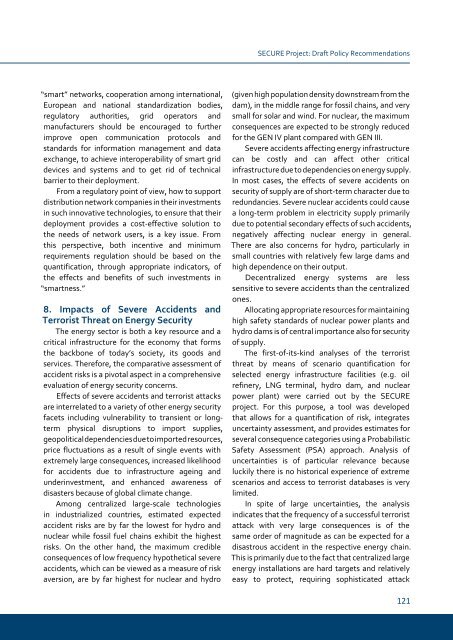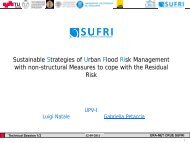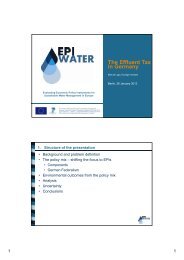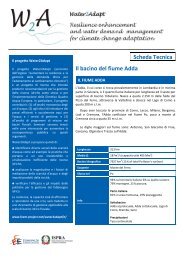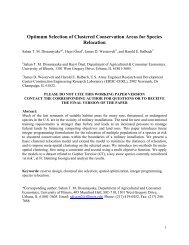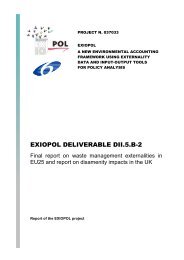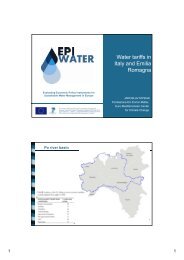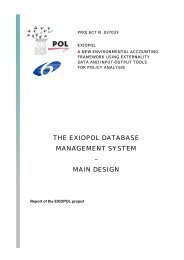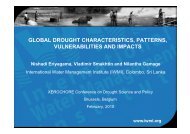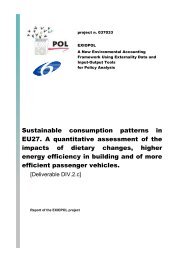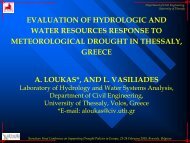Gulf and European Energy Supply Security - Feem-project.net
Gulf and European Energy Supply Security - Feem-project.net
Gulf and European Energy Supply Security - Feem-project.net
Create successful ePaper yourself
Turn your PDF publications into a flip-book with our unique Google optimized e-Paper software.
“smart” <strong>net</strong>works, cooperation among international,<br />
<strong>European</strong> <strong>and</strong> national st<strong>and</strong>ardization bodies,<br />
regulatory authorities, grid operators <strong>and</strong><br />
manufacturers should be encouraged to further<br />
improve open communication protocols <strong>and</strong><br />
st<strong>and</strong>ards for information management <strong>and</strong> data<br />
exchange, to achieve interoperability of smart grid<br />
devices <strong>and</strong> systems <strong>and</strong> to get rid of technical<br />
barrier to their deployment.<br />
From a regulatory point of view, how to support<br />
distribution <strong>net</strong>work companies in their investments<br />
in such innovative technologies, to ensure that their<br />
deployment provides a cost-effective solution to<br />
the needs of <strong>net</strong>work users, is a key issue. From<br />
this perspective, both incentive <strong>and</strong> minimum<br />
requirements regulation should be based on the<br />
quantification, through appropriate indicators, of<br />
the effects <strong>and</strong> benefits of such investments in<br />
“smartness.”<br />
8. Impacts of severe Accidents <strong>and</strong><br />
terrorist threat on energy security<br />
The energy sector is both a key resource <strong>and</strong> a<br />
critical infrastructure for the economy that forms<br />
the backbone of today’s society, its goods <strong>and</strong><br />
services. Therefore, the comparative assessment of<br />
accident risks is a pivotal aspect in a comprehensive<br />
evaluation of energy security concerns.<br />
Effects of severe accidents <strong>and</strong> terrorist attacks<br />
are interrelated to a variety of other energy security<br />
facets including vulnerability to transient or longterm<br />
physical disruptions to import supplies,<br />
geopolitical dependencies due to imported resources,<br />
price fluctuations as a result of single events with<br />
extremely large consequences, increased likelihood<br />
for accidents due to infrastructure ageing <strong>and</strong><br />
underinvestment, <strong>and</strong> enhanced awareness of<br />
disasters because of global climate change.<br />
Among centralized large-scale technologies<br />
in industrialized countries, estimated expected<br />
accident risks are by far the lowest for hydro <strong>and</strong><br />
nuclear while fossil fuel chains exhibit the highest<br />
risks. On the other h<strong>and</strong>, the maximum credible<br />
consequences of low frequency hypothetical severe<br />
accidents, which can be viewed as a measure of risk<br />
aversion, are by far highest for nuclear <strong>and</strong> hydro<br />
SECURE Project: Draft Policy Recommendations<br />
(given high population density downstream from the<br />
dam), in the middle range for fossil chains, <strong>and</strong> very<br />
small for solar <strong>and</strong> wind. For nuclear, the maximum<br />
consequences are expected to be strongly reduced<br />
for the GEN IV plant compared with GEN III.<br />
Severe accidents affecting energy infrastructure<br />
can be costly <strong>and</strong> can affect other critical<br />
infrastructure due to dependencies on energy supply.<br />
In most cases, the effects of severe accidents on<br />
security of supply are of short-term character due to<br />
redundancies. Severe nuclear accidents could cause<br />
a long-term problem in electricity supply primarily<br />
due to potential secondary effects of such accidents,<br />
negatively affecting nuclear energy in general.<br />
There are also concerns for hydro, particularly in<br />
small countries with relatively few large dams <strong>and</strong><br />
high dependence on their output.<br />
Decentralized energy systems are less<br />
sensitive to severe accidents than the centralized<br />
ones.<br />
Allocating appropriate resources for maintaining<br />
high safety st<strong>and</strong>ards of nuclear power plants <strong>and</strong><br />
hydro dams is of central importance also for security<br />
of supply.<br />
The first-of-its-kind analyses of the terrorist<br />
threat by means of scenario quantification for<br />
selected energy infrastructure facilities (e.g. oil<br />
refinery, LNG terminal, hydro dam, <strong>and</strong> nuclear<br />
power plant) were carried out by the SECURE<br />
<strong>project</strong>. For this purpose, a tool was developed<br />
that allows for a quantification of risk, integrates<br />
uncertainty assessment, <strong>and</strong> provides estimates for<br />
several consequence categories using a Probabilistic<br />
Safety Assessment (PSA) approach. Analysis of<br />
uncertainties is of particular relevance because<br />
luckily there is no historical experience of extreme<br />
scenarios <strong>and</strong> access to terrorist databases is very<br />
limited.<br />
In spite of large uncertainties, the analysis<br />
indicates that the frequency of a successful terrorist<br />
attack with very large consequences is of the<br />
same order of magnitude as can be expected for a<br />
disastrous accident in the respective energy chain.<br />
This is primarily due to the fact that centralized large<br />
energy installations are hard targets <strong>and</strong> relatively<br />
easy to protect, requiring sophisticated attack<br />
121


